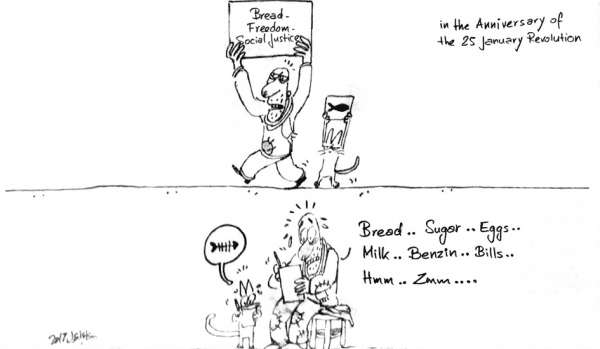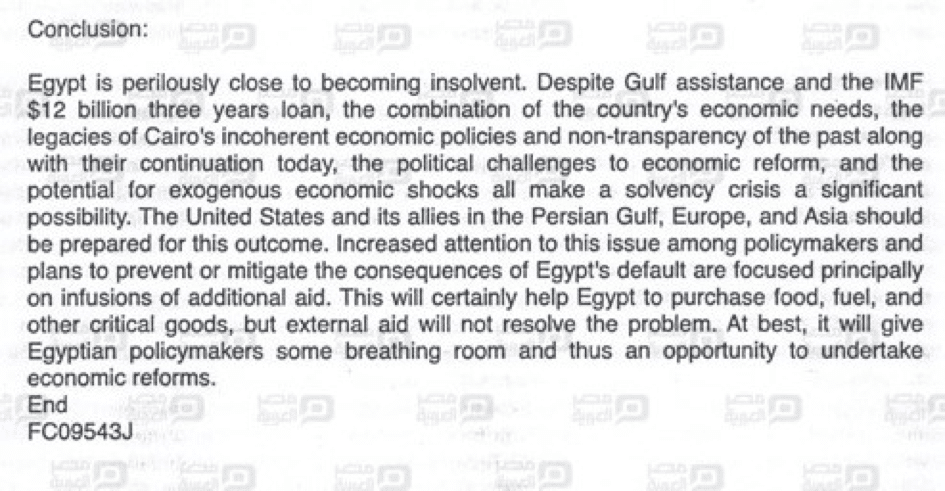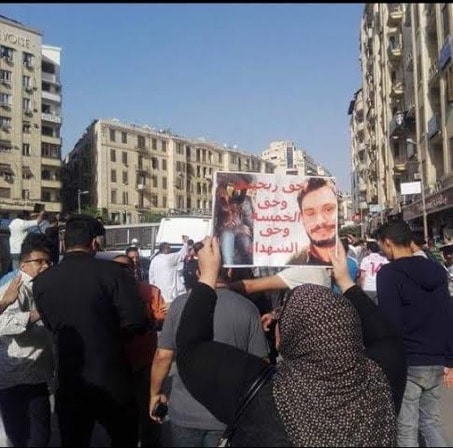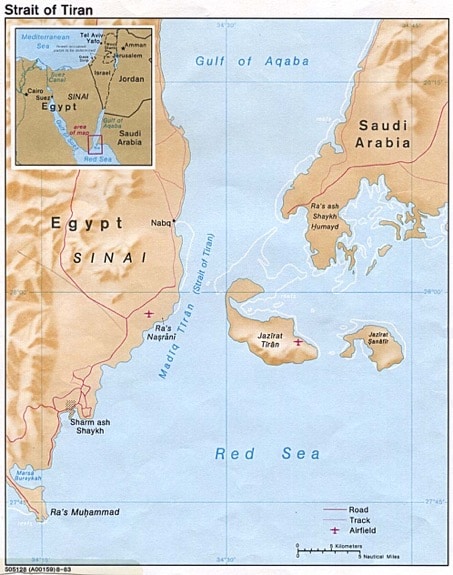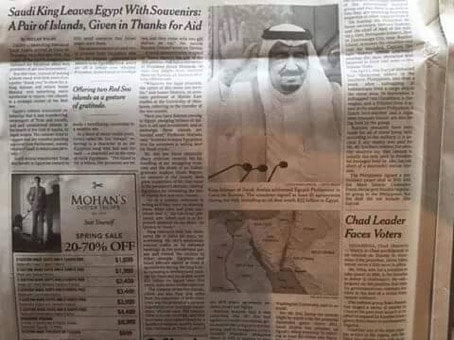2016 was a very difficult year for the Egyptians. Most—both the average man and the political caste—even say it was / is the worst year in the country’s history.
Attacking the “revolution” or uprising of 2011, its aims, symbols and representatives, has no longer become an excess of some “Mubarakists”, but obviously, the policy of the regime. This policy is encouraged by the fact that more and more Egyptians are longing to Mubarak’s time. They blame the 2011 revolution for their misery and not the policies of the regime.
In large parts of the heavily disadvantaged population, the Sisi regime has succeeded in fueling the fear of a fate like Syria, Iraq, Libya, or Yemen, so that this fear should become greater than any will to change. On the name of the war on terrorism, the regime justifies any unpopular measures. In 2016 all measures in all acts of politics were unpopular, even shockingly unpopular.
In the first two years of Sisi’s term as President, many ministers, governors and other senior officials have fallen victims to these unpopular policies as scapegoats. This was necessary to raise the image of the great “savior”, General Sisi, above all doubts. Nevertheless, the many “scapegoats” of 2016 were no longer enough. The image of the “just dictator” has suffered a great damage.
Although every regime should strive to achieve success in at least one field, to compensate for, or rather to distract the people’s attention from failures in other fields, the Sisi regime has been moving from failure to failure in almost all fields, disappointing the expectations of the people. Yet, the regime has brazenly continued to portray its failures as successes, and even victories. To highlight these failures in 2016, the following three main areas need a thorough examination:
- The economy and the fight against corruption,
- Democracy, the rule of law and internal security,
- Foreign policy
Economy and the fight against corruption
For any new regime, the economy is always the most important factor. If the economy is running, the regime can get away with other failures. But in the case of Egypt today, both the economic situation and corruption level have become worse than ever before.
In an interview on December 27th 2015, Mr. Hesham Geneina, the then head of Egypt’s Central Auditing Authority, was asked, on the occasion of completing his periodic report, to estimate the direct cost of corruption for the economy from 2011 to 2015. He figured it at 600 billion EGP. Of the many thousands of cases of corruption he had referred to the General Prosecutor’s office, only 7% were considered, while 93% have not been opened at all, he added.
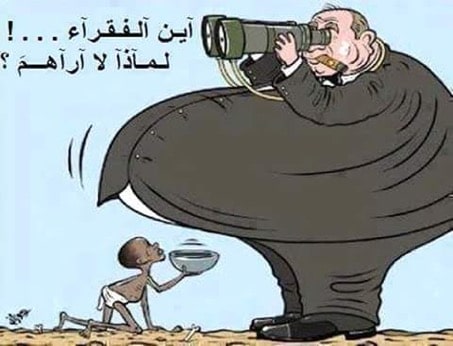
“Where are the poor, I cannot see them?“
Mr. Geneina’s statements were met with a great deal of rage from the government and its media outlets. Instead of investigating Mr. Geneina’s claims and prosecuting those accused of corruption, he was targeted for a systematic campaign of smear. He was accused, among other things, of giving exaggerated figures with the aim of damaging the image of Egypt abroad. He was also blamed for discouraging foreign investors from investing in Egypt. Thus, exposing corruption, which is the essence of Mr. Geneina’s duty, was portrayed as part of a wicked conspiracy against Egypt.
Although the position of Mr. Geneina has enjoyed an inviolable immunity since the establishment of this authority in 1942 the parliament quickly produced an unconstitutional law allowing the President to dismiss Mr. Geneina. Immediately afterwards, Geneina was fired. This was not enough. The powerful corrupt circles in the country were keen to make an example of Mr. Geneina. faced an unfair trial on charges of spreading “false information”, and later received a suspended sentence of one year in prison.
A “whistle blower” from his team smuggled the report and put it on the Internet, but no one dares to mention this report. Thus, Egypt has slipped from place 88 out of 167 to 108 out of 179 countries in “Transparency International”.
The military
For decades, the displeasure of the Egyptian productive capital has been growing against the ever-increasing share of the military in the national economy. In 2016, this displeasure took on a different dimension, so that General Sisi had to contradict this “claim” in his speech in December 2016. He said that the share of the army in the entire economy was between 1.5 and 2%. This estimate can hardly be proved against the well-known realities of the Egyptian economy.
The local private companies are suffering of this unfair competition with the military. Nowadays, there is no branch of economy in which the military is not involved and constantly expanding its share; industry and agriculture, real estate and construction, wholesale and retail trade, import-export, health care, …etc.
In the February 2017 issue of SWP-Aktuell—the publication of the “Stiftung Wirtschaft und Politik” (Foundation for Economy and Policy), one of the respectable “think tanks” close to the German government—dealt with this phenomenon. Under the heading “Egypt’s Armed Forces Cement Economic Power: Military Business Expansion Impedes Structural Reforms” Jessica Noll wrote in the introduction: “It is more than questionable whether, under these circumstances, the structural reforms that Cairo agreed with the IMF in November 2016 can be realized. Not least, international donors should urge the Egyptian leadership to reduce the special rights of the military” (p. 1). Noll elaborates:
Through the intensified cooperation between the army and the private economy dependency structures are established. For private companies, the economic expansion of the armed forces has made it harder to win public tenders because they can be undercut by the military. If companies want to be economically viable, they are increasingly dependent on cooperation with the armed forces, with the latter clearly having the lead.
Since the low prices are only possible due to the advantages and privileges of the army, an extreme distortion of competition takes place.….The military has a further competitive advantage because its economic activities are exempted from taxes. (p. 5)
In addition to the cheap “slavery” of the recruits, the military does not have to pay any energy or water charges for their projects or to provide any bonds or guarantees. Another big cost factor that only the private sector must cope with is the bureaucratic hurdles. These are the main source of public service corruption, all types of permits, confirmations, certificates, registrations, licenses, etc.
Neither the judiciary nor other civilian control authorities can penalize military offenses. Active and former military personnel have been protected since 2011 by a decree of persecution by civilian justice. They may only be tried before military courts. This immunity also applies to the economic activities operated by the military, which, because of their classification as “safety-relevant”, are completely opaque and favor an advantage.
Non-governmental organizations that are committed to greater transparency and the rule of law have been systematically pursued and harassed in their work since Sisi’s arrival. The media also turns out to be a corrective. In Egypt, press freedom is severely restricted; a critical report on the military is interrupted by state censorship. (p. 6)
The debt trap
When Nasser died on September 28th 1970, the sum of all debts in Egypt was $ 1.7 billion, including Soviet debts, all of which had been canceled with a debt cut after the 1967 war. Sadat has reoriented the policy towards the US and thus the financial policy towards the IMF. Despite the 1973 war with which the Sinai Peninsula was reconquered, the debts were less than US $ 2.5 billion by early 1974.
In February 1974, the famous Neo Liberalization Act was adopted, which was then called “Open Door Policy”. The enforcement of the terms of the IMF loan of 1976 of $ 185.7 dollar in the form of a sudden price increase of the basic foodstuffs by 30-50% led to the uprising of 18th and 19th of January 1977. This insurrection could only be crushed with massive military use, over 300 dead and several thousands of arrests.
During the 1980s the debt burden increased, so that the Egyptian government had to submit an annual report on its policies to the “Paris Club”. The participation of the Egyptian army in the Gulf War II for the liberation of Kuwait in 1991, which had legitimized this military use of the Western Allies, was rewarded with 50% debt relief.
When the uprising of January 2011 broke out, the total debt was about 83% of GDP (1 U$ dollar was 5.6 EGP at that time). By the end of 2015 the total debt had reached the 100% limit of the GDP. Thus, the debt service consumes annually over one third of the national budget (1 U$ dollar was at that time 7.8 EGP). The big bang came with the 12 billion U$ dollar credit of the IMF 2016. The conditions had to be fulfilled before the payment of the first rate.
The results of the notorious recipe of the IMF loans have been sufficiently tested and are well known. Not once did it lead to success, on the contrary, always economic disasters, always associated with social tensions and unrests.
On November 3rd 2016, the Egyptian government pushed the Egyptian pound against the U$ dollar in one breath as well as increased its energy prices (gasoline, diesel, gas, electricity) by about 50%. A few hours later the pound was devalued by about 50% and the prices, all the prices of goods and services, were shot through the ceiling. The consequences are devastating, the economy has almost come to a standstill. The part of the population, who lives from hand to mouth, has been almost doubled.
“By a devaluation of the Egyptian pound against the U$ dollar by some 130 per cent, the prices in the country had increased by more than 40 per cent in 2016.” (Noll, Egypt’s Armed Forces Cement Economic Power, p. 3).
The real problem—and also cause—of this misery remains. The borrowed money is not pumped in real, reasonable investments, in industry and agriculture, but mainly for the service of existing debts and for the import requirements, which systematically destroy the existing structures of the productive forces
The bottle neck
For over two years, the government propaganda has been active in spreading illusions about the economic situation. According to this propaganda, Egypt is facing now a bottleneck and the breakthrough is about to come, as soon as the great projects of the military give their fruits. These are large projects under the leadership of the army on the orders of Sisi.
Neither in the professional world nor in society was any debate about their necessity, usefulness or profitability or priority level. Projects such as the expansion of the Suez Canal, the new administrative capital, the cultivation of 630,000 hectares in the desert (for which there is not enough water) and the thousands of miles of unnecessary roads in the desert run in full swing to prevent a possible proper Development. On the one hand, they destroy the already few financial reserves, making the debt spiral unavoidable, and on the other hand, serve the wild “corruption demand”, especially among the uniformed.
Immediately after the pound’s float, its value fell free-fall against the U$ -dollar. In order to catch it in the absence of large foreign exchange reserves, the government has offered securities with 20% interest rates in all state banks to strengthen demand on the pound. This measure has led to the fact that, on the one hand, credits to the medium-size and small enterprises have become virtually impossible, and—as there is a lack of investment—the already “official” over 20% inflation rate is still fueled on the other.
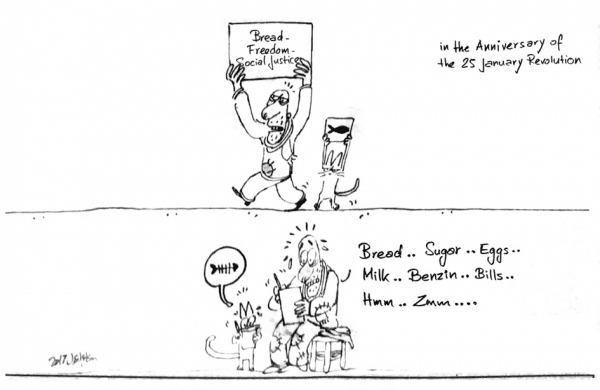
Comic about the anniversary of 25 January Revolution
Because of this catastrophic state of the Egyptian economy, a team of experts from the International Relations Committee of the US Congress and the White House has presented to the Trump Administrator a “Top Secret” report on January 18th. (“Trump Plan: CIA to Intervene in the Case of Bankruptcy in Egypt,” Masr al Arabia, February 3, 2017.) The 9-page report bears the code FC09543J and concludes:
Democracy and the rule of law
Both the uprising of January 2011, which led to the overthrow of Mubarak and its second wave, the uprising of June 30th 2013, which led to the overthrow of Morsi, the call for democracy and the rule of law was unmistakable and central. That is why General Sisi had to announce the creation of a new constitution as the first step in his so-called “road map” on July 3rd. In January 2014, this constitution came into force with a large majority by means of a national referendum.
The new constitution reflected the political balance of power in the society at the time fairly well. That is, because the “revolutionary heat” on the streets had not yet completely cooled down, the Egyptians have got the best constitution in their history.
In fact, since the end of the Mohammed Ali dynasty in 1952, all the regimes in Egypt have not been stained with glory in terms of democracy and the rule of law. Since the military has appropriated the entire state, it was the real end of the rule of law.
In the relatively progressive phase (Nasser-Zeit), social justice had replaced democracy. After that, there was neither social justice nor democracy. The year 2016, however, stood out. Everything indicates, as if the hated police forces are revenging on the people because they have dared to rebel against them.
The regime’s speeches refer to the insurrection of January 2011 – an even, which is recognized in the 2014 constitution as a revolution of historical dimension—as an externally controlled plot. It is therefore necessary to eradicate all the consequences of this plotting, to restore the old state under Mubarak, that is, to reverse the liberties and the little bit of the rule of law that have been achieved by that revolution. Such a goal can only be realized with brutal violence. That was 2016. I would like to briefly describe a few examples showing the extent of injustice.
The Regini case
Dr. Julio Regini (28) was an Italian researcher who was working on the independent labor unions in Egypt. He had arranged to meet a friend in the town center on January 25th 2016. On February 3rd 2016 his naked body was found in the desert on the outskirts of the 6th October City. It was a traffic accident, officially declared the Ministry of Interior.
On February 4th, the court’s medicine report confirmed that Regini was subjected to brutal torture. The Italian prosecutor’s office has turned on, many reports condense the involvement of the Egyptian secret police in the Regini case.
On March 14th, an eyewitness appears on the Egyptian television, his story was supposed to relieve the police. The story of the witnesses arranged by the police soon proved to be a complete invention and a lie.
On March 24th, the Interior Ministry announced the death of five persons in a shooting allegedly responsible for the assassination and torture of Regini. The Egyptian prosecutor’s office supported this statement on March 30th.
On April 21st, the news agency Reuters published from six different sources: the police have arrested Regini on the day of his disappearance. On the same day, according to this Reuters report, the Ministry of the Interior claimed that it had never placed Regini under observation. Shortly afterwards, the Egyptian prosecutor confessed; Julio Regini was under observation of the secret police. On April 26th, the Egyptian lawyer of the Regini family was arrested.
On the 12th of June, the Italian investigation committee accused the Egyptian side, misrepresenting false facts and hindering the investigation. On June 30th, Italy increased the political pressure with sanctions. On July 8th, Regini’s mother holds a press conference, threatening with the publication of 250 pictures of his brutal torture.
On September 9th, the Egyptian investigating team admits in Rome that Regini was under surveillance and that the five shot dead did not have anything to do with the case, but their families remained under arrest until now.
Confess! Yes, since political relations with Italy is too important to be disturbed by such a “trifle”. However, no single person has been held responsible for this crime so far. Otherwise the entire system of oppression would crumble if it were to show such “weaknesses”.
In her press conference Regina’s mother said; the police had treated her son like the Egyptians. This statement was confirmed mutatis mutandis by General Sisi at his press conference with the French President Francois Holland on April 19th 2016 in Cairo. Sisi corrected Hollander’s understanding of human rights; “… Europeans do not know that we have other human rights standards.”
Tiran and Sanafir are two small islands at the entrance of the Gulf of Aqaba in the Red Sea, which have been proven Egyptian since the ancient empire about 3000 BC. These two islands have only a military-strategic importance as they make the lock for the entrance of this important waterway. That is why much Egyptian blood flowed on them in all the wars of this region.
In early April 2016, the Egyptians were surprised by the news report; a new agreement has been signed between the governments in Egypt and Saudi Arabia to establish maritime borders between the two countries. Suddenly, the two islands belong to Saudi Arabia, for that the Saudis would finance some projects for the development of the Sinai Peninsula….a piece of land as a gift…
On April 15th, the demonstrations began in front of the Chamber of Journalists in downtown Cairo. The protest movement escalated when Sisi announced on TV; that the matter had finished and he would not want to hear any Contradiction any more. Thereupon, the protest movement took up the following holiday (25th of April, return of Sinai after the 1973 war) as the perfect occasion and called for a nationwide demo against this agreement.
On that day demonstrators went down the streets despite the heavy threats of the Ministry of the Interior, even though the police had besieged and locked all announced meeting points with armored vehicles. Several hundreds were arrested and sentenced to five years’ imprisonment without and 100,000 EGP (11,000 U$ Dollar) with fast trials—all of them have got the same sentence. The wave of protest became higher.
On May 2nd, the police besieged the journalists’ chamber and demanded the extradition of two journalists, who had entrenched themselves in their chamber, which enjoys immunity by law. The two had called on their blogs for the demo against the agreement, as written in their arrest order. The elected Council of the Chamber of Journalists had, of course, rejected the extradition of the two colleagues and relied on the constitution. Thereupon the police stormed the chamber building and arrested the two journalists by force.
And as fate sometimes plays this way, this happened just on the International Day of Press Freedom.
On June 21st 2016, the Administrative Court, with its historical judgment, gave the regime a sound euphoria; the islands were always Egyptian and will remain so. From then on, the Egyptians experience a unique “perversion” in history. The state, i.e. here the executive power, contested this majority verdict to reject its sovereignty over the islands. According to the judge’s text of the verdict, the state could not provide a single useful document, in contrast to the complaining party. This has delivered hundreds of documents and proofs.
The protesters arrested during the protest movement went into revision. They were gradually released but everyone had to pay the 11,000 U$ Dollar money penalty, which is for the average Egyptians a fortune.
The paradox was how the regime fought its enemies in this battle. It mobilized all its available media to throw the opponents of the deal cheekily with dirt and subordinate them to high treason because in this matter they deny to follow Sisi. Those who say; The islands are Egyptian, are traitors, while those who say they belong to Saudi Arabia are patriots. What a twisted world!
On January 16th 2017, the Supreme Administrative Court, as the last instance, passed a final irrevocable verdict in 58 pages (Decision of the Supreme Administrative Court, January 16, 2017); the islands were and will remain forever an inseparable part of Egypt. Accordingly, the Agreement is void. Nevertheless, the regime still does not want to stretch its arms and is now trying to save the agreement by passing it to its tailor-made parliament. Logically this will not work….but what was logical in 2016?
When the dust of this battle is laid and a proper distance to the battlefield is gained, the just question arises; Why Saudi Arabia wants the two rocks in the Red Sea? And why just now?
Saudi Arabia does not need the two islands at all. This is about Israel, which, in addition to their obvious military-strategic interest in this waterway, wants to revive its old canal project. The channel, as a competition to the Suez Canal, should link the Red Sea across the Gulf of Aqaba and the Dead Sea to the Mediterranean. For this, control over the Gulf of Aqaba should not remain in Egyptian hands.
Political Islam
With the insurrection of June 30th 2013, the Egyptians ended the rule of the Muslim Brotherhood. Most of them thought that the chapter of political Islam and the abuse of religion was concluded forever. This was even sealed by Article 74 of the Constitution of 2014; No parties could be admitted on a religious basis.
Consequently, the Muslim Brotherhood Party was dissolved and banned. However, the “Salafists” with their archaic Weltanschauung (world view) remained. Until now, they enjoy not only freedom of organization and movement, but also cooperation with power centers in the state, a kind of mutual support.
The non-torn chain of Islamic terrorist attacks prompted General Sisi to repeat his appeal to his state institutions for religious affairs (Azhar and the Ministry of Religious Foundations); They may renew the religious discourse. This sounds rather hypocritical when one sees how the Salafis, especially in the country side, can expand their influence and drive their mischief.
This is about the rights of those who Think differently about religion, i.e. freedom of religion for Christians, Baha’is and even Shiites, who are then regarded as “unbelievers”. The list of attacks for these fanatic reasons has been very long since President Sadat had begun the incidents of sectarian strifes in “El Zauia El Hamra” in 1971. That is why I am limiting myself here to 2016.
Seven churches—mainly in the country side—near Luxor, Asiut, Minia, Cairo and Alexandria were set on fire. Six times, houses and businesses of Christians were attacked, robbed, burnt and beaten and displaced. In four other cases, Christians were slaughtered, that is, with the IS method of “slaughtering” like in the “sacrifice” ritual by separation of the head from the body. This was in Tanta, Ariesch, Zagazig and Schubra. All these crimes took place before in public.
The biggest problem, however, is that in none of these cases was the long arm of the law so long that it could grab any of these criminals and call to account. The regime insists on treating these kinds of “problems” extralegal, out of court. Therefore, a body called The Family House was created. Thus, all criminals get away with impunity, the Islamic terror is encouraged and the victims have to seek shelter and support in the institutional church, i.e. they cannot sue for their right as citizens in a civil state.
Only two examples of this ambivalence:
In the village of Kom Elloufi in the governorate of Minia, 15 Salafis have told a Christian farmer that he “intends” to make a church out of his house under construction. On June 23rd 2016 about 300 Muslims gathered in front of the alleged house and put it on fire. The fire spilled over to three other neighboring houses. All four burned completely.
The second case also occurred in Minia in the village of El Karm in October 2016 but got out of hand into a moral scandal. The barbarians pulled a 70-years-old Christian woman and dragged her on the street completely naked with hysterical howling until a Muslim neighbor woman saved her and put an end to this mass-psychotic spook.
This scandal has shattered the society in its foundations so violently that General Sisi had to officially apologize to the victim and promised to call the guilty to account. On January 25th 2017, the last five defendants were released and the case put ad acta. The cries for help of Christians and sincere Muslims throughout the country to Sisi personally remained ineffective to this day. (Sources of all information about the crimes against Christians are taken from print and internet media but mainly from the publications of the journalist and well known researcher Mr. Nader Shokri.)
Foreign policy
Even if there is a lot to be said on this subject, I will restrict myself to a single aspect, which illustrates the double-facedness of international politics.
The West
Since his assuming office, General Sisi has been trying to convince the West that the Egyptian military is the most reliable partner of the West in the region. It took about a year to get the West convinced. The visit of Siegmar Gabriel in the so-called economic conference of Sharm-El-Sheikh in March 2015 was the first signal for this.
After that the West has ceased all its “worries about democracy” in Egypt and opened a new chapter in the relationship. The Sisi regime is indispensable for a further deal to limit the refugee flows from the region. It is all about Africa, and not just those driven by the wars. These wars are coming to an end sooner or later, but economic development and combating the shortcomings of most African countries is a long-term task for which Europeans need a strong prison keeper like Sisi. Even less can the Europeans afford a collapsed Egypt with its over 90 million population.
But no one in the West wants a proper development in Egypt with—somehow—democratic structures. This would lead to more and more independence, conflicts of interest and an unpredictable rearrangement of the political landscapes of alliances in the region. Therefore, the regime should be held on the western “cannula” at all costs. This explains also the nature of this support, which Jessica Noll mentioned astonished in her a.m. article; “… Since Egypt is not exposed to any acute external threat, it can hardly be justified that the country, heavily hit by economic problems, has the world’s tenth largest army with approximately 440,000 active soldiers.” (Noll, Egypt’s Armed Forces Cement Economic Power, p. 4.)
In its resolution of May 25th 2016, Amnesty International criticized the EU; about half of the member states of the European Union have condemned an EU-wide arms export ban to Egypt. The EU is thus risking complicity in a wave of extreme murders, the violent disappearance of the opposing persons and torture. (“EU: Halt arms transfers to Egypt to stop fueling killings and torture,” Amnesty International, May 25, 2016.)
German armaments companies have been supplying Egypt with weapons and armour technology for many years. Between 2001 and 2013 alone, Germany granted the sale of war goods worth more than EUR 361.8 million to the desert state. According to the database of the Campaign Against Arms Trade (CAAT), it was mainly tanks and vehicles, electrical equipment, war ships, ammunition, technical equipment and small arms, as well as image equipment and aircraft. These arms exports to Egypt were approved by the German federal government, although the situation in the country, according to estimates by the Bonn International Center for Conversion (BICC), is anything but unproblematic especially in recent years. (“German armament expeditions to Egypt,” BICC.)
In his report of December 19th 2016 to be presented to the American Congress, the Congressional Research Service ranked Egypt first among the developing countries in the volume of its arms missions for 2015 with 5.3 billion U$ dollars and the second place after Qatar in the volume of the closed arms treaties with about 12 billion U$ dollars.
Conclusion
Is it true that the situation of the Egyptians, as the Sisi regime wants them to believe, is much better than that of the Syrians, Libyans, Iraqis or Yemenites?
… a never ending series of coffins of the victims of terror from Sinai and other parts of the country….a country in which young people prefer the most probable death on an overcrowded tug boat in the Mediterranean to life in their homeland….a constantly declining one Income, which was hardly enough to survive….a rapid inflation….a corruption, rampant and out of control at all levels,….laws and constitution, which are trampled on a daily basis….education and health, which have become privileges of the super-rich,….a state which is unable to prevent audit checks in schools or regulate traffic on the streets,…
The Egyptians must accept all this…and for what?! For their security, which can be realized only by the preservation of the “state”. What does—or what is the value of—”security” under these circumstances?!
No; we are not better.

